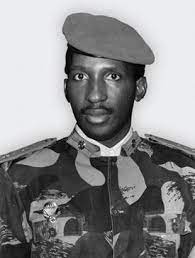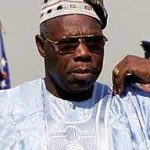The Guardian newspaper of Wednesday, October 4, 2006, carried Die somewhat obscure report; it said that the family o f the assassinated President Thomas Sankara of Burkjna Faso had rejected the offer of 43,445,000 CFA Francs compensation offered to them by his assassin, Blaise Campaore, the current President of -Burkina Faso, who seized power in the coup of October 15, 1987. Blaise Campaore’s offer of money for his perfidious assassination of one of the most remarkable sons of Africa of all time, nineteen years ago, this week, was in response to a request by the United Nations made last April for the Burkinabe government to shed more light on the circumstances surrounding Blaise Campaore’s crime, and also for the family to be shown his burial place. According to the report, the United Nations had also demanded for a fair trial and for compensation for the harm done to the Sankara family.
In response to the UN, Campaore offered to build a mausoleum in Sankara’s memory and to name an avenue after him. In rejecting the offer of the regime, the family said “that was not what the family wants. We just need to know what happened” .
Let me confess that before reading that report in The Guardian newspaper, I had not been thinking about Thomas Sankara for a while. But it is testimony to the truly liberating impact which he made on recent world history in a sh o rt life time (he was assassinated before his 38th birthday), that almost nineteen years after he was brutally and senselessly assassinated in an unpopular coup d ’etat, organised by one of the most vile men in recent African history, Blaise Campaore, even the United Nations Organisation was obliged to respect the memory of Thomas Sankara by demanding for justice in his case. I have a most recent illustration ofthe poignancy of Sankara’s example from my last visit to Mali in April/May, 2006. The local chauffeur that I used in my trips around Bamako, the Malian capital, is a smallish man called Diallo; on one o f our drives to visit a radio station in the business district o f Bamako, we had passed by the statures o f several figures from the stridently pan- African days of nationalism. We then began to compare the earlier idealism with the stark realities of today, exemplified by the various IMF regimes holding the forte all around the African continent. Diallo shook his head, and surprisingly told me that this is the time that Africa needed the exemplary leadership of a Thomas Sankara most.
I looked around to see what passes for the content of leadership in most African countries today, from the megalomania of a despot like General Obasanjo in Nigeria through to the contemptible Blaise Campaore, who seems permanently diminished by the enormity of the crime that he committed and is therefore unable to shake off his troubled and guilty conscience; I completely agreed with this modest and smallish Malian man that he was very right after all.
But who was Thomas Sankara? Why is he re-appearing to haunt a troubled world and its soul nearly two decades after his song of liberation was forcibly and abruptly terminated by evil people? In a continent where ‘market forces’ have been unleashed
like a memory-wiping monster, where ruling elites now propitiate the gods of money and consumerism; in an Africa where the bonds of civilised relationships are being tom asunder in deference to the newworld order of ‘privatisation’ and ‘business models’, it is very important, in my view, to bring to the minds of the younger generations of Africans, the exemplary lives of individuals who embodied the OTHER Africa; the Africa of the people. Thomas Sankara belongs in this pantheon of heroes. Thomas Sankara was born in Yako, in the then Upper Volta, on December 21,1949. His family wanted him to become a Catholic priest, but after basic military training in secondary school in 1966, Sankara began a military career at the age of 19. A year later, he was sent to Madagascar for officer training where he witnessed popular uprisings in 1971 and 1972. Returning to Upper Volta in 1972, Sankara fought in a border war between his country and Mali in 1974.
In a biography of Sankara titled “A Warrior’s Tale”, Kangsen Feka Wakai, had written that Sankara’s “political coming-of-age” must be located within the “euphoric excesses endemic amongst Upper Volta’s post-independence bourgeoisie in the sixties”. Nevertheless, by 1976, he had become the Commander of the Commando Training Centre in Po, and during the same year, he met Blaise Campaore in Morocco. Thomas Sankara belonged to a group of young officers who formed a secret organisation known as “Communist Officers’ Group (Regroupment des Officiers Communistes or ROC) along with Henri Zongo, Jean-Baptiste Boukari Lingani and Blaise Campaore. This was during the presidency of Colonel Saye Zerbo.
Thomas Sankara’s charismatic personality had already made him a popular figure in the capital city, Ouagadougou, during this period. He was a guitarist who played in a band called “Touta-coup Jazz” and was also known to love riding motorcycles. In September 1981, Sankara was appointed Secretary of Information in the government, and he earned even greater acclaim when he appeared on a bicycle to attend his first cabinet meeting. The anti-labourd rift of the government became unbearable for him, and he quit his post on April 21, 1982, declaring that “malheur a ceux qui baillonet le peuple” ! , which translates roughly as “misfortune to those who gag the people” !
The November 7, 1982 coup, led by Major-Doctor Jean- Baptiste Ouedraogo, appointed Sankara Prime Minister in January 1983, dismissed him on May 17 and placed him, Henri Zongo and Jean-Baptiste Boukaiy Lingani under house arrest. This triggered a popular uprising in Upper Volta; on the crest of the wave of that popular unrest, Blaise Campaore toppled the regime. At the age of 33, Thomas Sankara became one of the youngest heads of state in the world. But Africa was notorious as the continent of coups, so what made Thomas Sankara different?
Sankara saw the’takeover of power as a basis to begin to organise a democratic and popular revolution and he was firmly anti imperialist and pan-African. Upper Volta has for long been one of the most underdeveloped countries in the world. Wakai’s biography said it had 90% illiteracy rate, the world’s highest infant mortality rate (280 deaths for every 1000 live births), and one doctor for 50,000 people. Sankara oriented the revolutionary process that he led to fight corruption, promote reforestation, avert famine and it made education and health real priorities of the state.
By the first anniversary of the revolutionary process, the country’s name was changed to Burkina Faso (land of upright people). Sankara’s leadership helped the Burkinabe people to transform the manner in which they perceived themselves. Wakai said that Thomas Sankara instilled in them the belief that no goal was beyond reach. “Modesty, a characteristic valued in African cultures, was one of the trademarks of his leadership. With modesty, Sankara created a path to the country’s future on which all was welcome to travel”. It was indeed true that Sankara lived a modest life and he openly declared his assets before the Burkinabe people and the whole world. These were a salary of $450 per month, a car, four bikes, three guitars, a fridge, and a broken freezer. He was in fact the poorest president in the world. His policies were also directly related to the needs o f his people. In February 1984, tribute payments to and obligatory labour for village chiefs were outlawed.
The state nationalised all land anfl mineral wealth on August 4, 1984. The following month, October, saw the abolition of the rural poll tax; in November 1984, within fifteen days, 2.5 million children were immunised against meningitis, yellow fever and measles; a campaign to plant 10 million trees to slow the advance of the Sahara was initiated and by the end of 1986, a UN-assisted.


